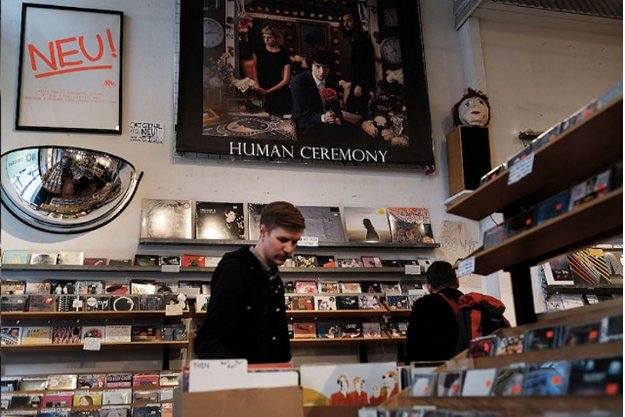‘Other Music’ and the New York City of a Bygone Era

Time catapults us forward into the completely digitized unknown. Even the term “analogue” conjures a sepia-toned, dusty image of a bygone era that’s laughably outdated. But if were born in the mid-80s, as I was, the rapidity of this shift is likely to make you uncomfortable. You might feel ripped asunder with each foot clinging to one of two opposed time periods — the analogue age, which has slipped approximately 99 percent into obscurity, and the digital age, which pixelates and secludes our person-to-person experiences to the point where the warmth of an intimate interaction feels somewhat foreign and cold.
Other Music, a new documentary directed by Puloma Basu and Rob Hatch-Miller that received its world premiere at the Tribeca Film Festival this year, directly addresses this cultural shift.
The movie chronicles the shuttering up of New York City’s most beloved record store, Other Music, which took exquisite pride in championing the kind of musicians whose work you wouldn’t find at Tower Records across the street. The owners and employees acted as indie curators, relishing every opportunity to geek out over thousands of obscure musicians, personally selecting albums based on their customers’ tastes and inclinations.

For 20 years, Other Music shepherded a community that sought music from the strange and the under-recognized. For obvious reasons related to the categorical dominance of iTunes, Spotify, Google Play, Pandora, Spotify, et. al., this so-called “influential hub of music culture” was forced to close its doors in 2016.
The filmmakers intercut their documentation of the store’s final days with recollections from employees and customers, along with invigorating interview snippets featuring a diverse selection of Other Music enthusiasts, such as TV on the Radio’s Tunde Adebimpe, Jason Schwartzman, Ezra Koenig, and Regina Spektor, who explains, in a perfectly relevant aside, that she is “so analogue” that she can’t read a book on her Kindle. Spector also speaks of record stores, bookstores, and theaters as “temples” that serve an important cultural need, and that, while these places of communal art-worship are currently on a decline, she expresses hope that the societal need for these refuges might eventually spark a renaissance.

Other Music effectively captures the joy of music obsession and the innate thrill of human contact and amped-up conversation. On the surface, the documentary is about this particular store at a particular tipping point in time, but the implications are more far-reaching and ambitious. Other Music emerges as a symbol for the kind of meccas that thrived on face-to-face engagement and idiosyncratic knowledge, a safe haven for lovers of anything and everything that wasn’t mainstream -- the kind of place that is now systematically being priced out of existence.
The climax of the documentary is unusually enthralling and poignant, thanks in part to the spectacular editing. As the former store is stripped of all of its insides, a musical rhythm organically materializes, and this exciting concept builds to a crescendo. Even as the store is dismantled and defanged with large hammers, a musical beat comes forth, and it plays like a reassuring funeral hymn. It’s a magical moment of form mixing meaningfully and ecstatically with content. Though the coda is melancholic, the raw materials of music live on.
Author Bio:
Christopher Karr is a contributing writer at Highbrow Magazine.
For Highbrow Magazine































































































































































































































































































































